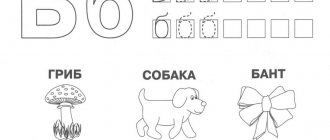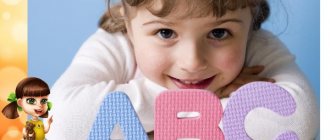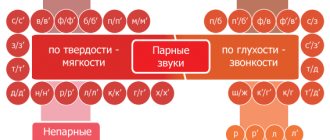Age characteristics and correction of speech disorders during group classes
Knowledge of the peculiarities of the lives of adults related to their work is vital for children, but at different ages the approach to studying issues related to professions should be different. He must take into account the age characteristics of the children.
Poster about different professions
Lexical topic “Professions” in the middle group
Classes in the middle group not only develop speech skills, but also provide basic knowledge about what professions are and what they are like.
Purpose and objectives of the lesson: getting acquainted with different professional specialties
The following tasks are performed:
- When working with children, they are given the concept that there are different professions and are told about their main features.
- Vocabulary develops, articulation improves when pronouncing sounds.
- Children develop auditory attention and logical thinking.
It is recommended to plan classes for the near future.
Brief lesson plan
Finger gymnastics is performed with children. It is done as follows:
Open lesson on speech development in the first junior group
There are many noble professions (In this case, in turn, each finger of the right hand is connected to the thumb).
Both useful and pleasant (Make the same movements with the fingers of your left hand).
Cook, doctor, painter, teacher, salesman, miner, builder (Connect the fingers of the left hand and right hand with the thumbs).
I don’t name everyone at once (at the same time, the kids clench and unclench their fists several times).
I suggest you continue (children stretch their arms forward, keeping their palms facing up).
Next, the teacher conducts a poetic dialogue with the kids: “Was there a shoemaker?/Was!/Sewed boots?/Sewed!/Who are the boots for?/For the neighbor’s cat!” This exercise is designed to improve the clarity of diction and work on the expressiveness of the pronunciation of sentences.
The lesson uses tongue twisters to develop clarity of pronunciation and correct pronunciation of various sounds. At the same time, the teacher and the children try to pronounce certain phrases. Here is an example of a tongue twister: “The leaking faucet really wants the plumber to fix it.”
Important! Throughout the lesson, children are given a variety of vocabulary exercises.
Thematic poems and tongue twisters
The poetic form of presenting material to children helps them better assimilate the material. Therefore, it is important to use poems and read them aloud to the teacher together with the children. One of the exercise options is to ask poetic riddles.
Here are some examples:
- “Doctor, but not for children, but for birds and animals. He has a special gift. This doctor..." (Vet).
- “We teach children to read and write. Love nature, respect the elderly." (Teacher).
- “At work, day after day, he commands with his hand. That hand raises. A hundred pounds under the clouds." (Crane operator at a construction site).
Tongue twisters not only allow you to improve your vocabulary, but also provide an opportunity to improve children’s diction.
The following tongue twisters can be used:
- “Sailors in sailor suits. Sailor suits in stripes."
- “Two woodcutters, two woodcutters are chopping wood with axes in the yard.”
- “The weaver is weaving fabric for Tanya’s dress.”
When working with children in a speech therapy lesson on the topic “Professions,” the following game can be used. It's called "Fable Poems."
Speech therapist session with children
Its goals are: improving auditory attention, improving the ability to think logically, and developing children’s vocabulary related to the topic of professions.
The game consists of reading poems about the professions of adults to children, and in them the teacher makes erroneous statements. Kids are required to determine what is true and what is not. At the same time, the speech therapist and children discuss the answers in detail.
Lexical topic “Professions” in the senior group
Important! At this age, children are able to master not only basic concepts about various specialties, but also begin to create general ideas about the world of adults and the place that professional activity occupies in it.
Objectives of the lesson: forming a holistic picture of the world
Children are taught to briefly talk about their professions. During the lesson, they learn more about the types of activities adults do. When assignments are completed for children in the speech therapy group on the topic “Professions,” children are taught that work is necessary and its social significance is explained.
Kids are trained to form masculine and feminine words from the names of workers (military and military, teacher and teacher).
Note! Children develop the ability to recognize speech by ear, improve visual perception and attention. They are helped to develop memory, attention and the ability to speak coherently.
Children are encouraged to be active, take initiative, and have the ability to work collectively.
Lesson outline
When considering lexical topics in the senior group, a thematic physical education session first takes place.
A conversation is held about what a profession means for an adult. They talk about how there are different professions and give relevant examples. They talk about the need to earn money to buy household items that the family needs.
Lesson on speech development in the senior group of kindergarten
The story is told on behalf of the kids who were arguing about whose profession was more important. The teacher and children discuss this dispute and give their answers.
A rhyming game is being played. For example, phrases are uttered about professions related to transport: “The train is driven by ... (driver). Plowing the field... (Tractor driver)..." Children must complete each phrase.
Children take cards out of envelopes and see pictures of a person working. They should talk about his specialty.
Children, with the help of a teacher, compose their stories about various professions, guided by a rough plan and pictures.
A physical education session is held. At the same time, poems about professions are read, during which children imitate the corresponding movements.
The teacher gives phrases, and the children guess who could say them.
Kids are asked to name workers in masculine and feminine genders (for example, pilot).
In conclusion, the results are summed up, the teacher reminds the children what new they have learned.
Children are told about professions
Game technologies in education
In the process of working with children, lexical exercises are actively used and physical education sessions are held. Children are taught to independently compose simple stories about various specialties. Questions and riddles are actively used, to which children must find the answer.
Lexical topic “Professions” in the preparatory group
At this age, it is important to prepare people for school, to give them knowledge of how adults live.
Purpose and objectives of the lesson
In classes with preschoolers, it is necessary not only to expand the vocabulary related to the topic under consideration, but also to form their horizons, make knowledge more systematic, develop children’s communication skills, and the ability to coherently express their thoughts.
Activities
At this time, physical education and game moments are still important, but the formation of an outlook, the ability to express one’s thoughts and the ability to conduct a focused dialogue with other people are of particular importance.
Preliminary work on studying literary material
The teacher tells the children about descriptions of various workers that are available in children's literature.
The children read aloud thematic literary works.
Equipment
When the lexical topic “Professions” is considered in the preparatory group, pictures are needed as handouts. They should depict representatives of various professions.
Note! The teacher should have prepared demonstration images on the topic of the lesson. A board or screen can be used on which visual material will be shown.
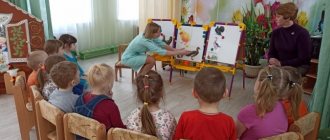
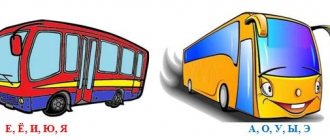
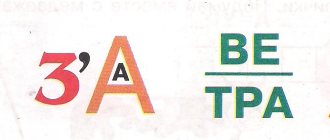
![Producing the sound [L] to a child in stages. Articulation gymnastics, speech therapy exercises, pronunciation lessons with pictures](https://doktorobrubov.ru/wp-content/uploads/postanovka-zvuka-l-rebenku-poetapno-artikulyacionnaya-gimnastika-logopedicheskie-uprazhneniya-uroki-330x140.jpg)
